Getting to the village
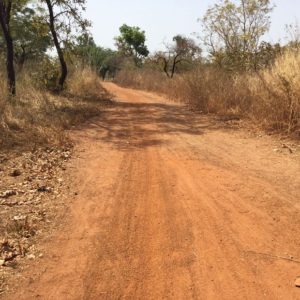
Roads in Burkina Faso can be good. The first 40km to this well were on such a road. Then we turned right along the usual dirt track. We asked how far we had to go along this road. “About 30 km, 20 miles,” was the reply. From previous experience, this sounded like very bad news. As it happened, this road was really very good. Yes, it was uneven and we were bounced about a bit, but there were far fewer potholes than is usual on the compacted dirt roads. We put this down to the fact that this was a very remote village and there would be very few lorries along it.
All the way along this road, we drove past ladies riding bikes which had large piles of wood on the racks behind the saddle. They are allowed to take branches from some trees in some areas which they then transport on their bikes back to the main road. There, it is stacked and sold to organisations who come to collect it. The weight of the wood they transport must be huge and the amount they are paid is probably very little. We must have passed 50, perhaps even more, ladies working this way. We saw only one man doing the same.
Little sign of anyone living here
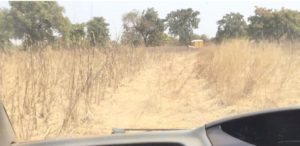
Halfway along the road, there was a small village. This was the only evidence of human life before we arrived at Legbanon. The final 5 miles, or so, were along a much worse road. In fact, at one point we were almost driving through long grass. There must be an occasional lorry along here because we saw huge containers of cotton harvest waiting to be collected. Clearly, this is the means of income for some of the people there.
On the whole 30 km of the road to the village, we had seen no other vehicle.
Arrived!
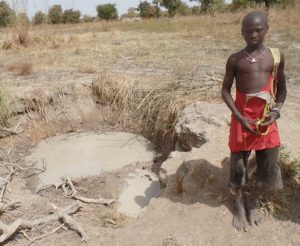
When we arrived, there were some boys at the well. The language here is Dagari so Jeremy was able to talk to them – although he said they laughed at his accent. One of the boys took us to show us a place he had dug to get water before the well was drilled. They used it for drinking water until the cattle also started using it too. The next place to get water was 4 km away.
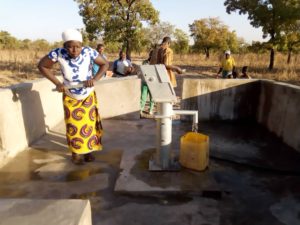
We had not told the people here that we were coming. However, one of the ladies arrived to fill up her huge bowl. It took some time to fill. The bowl itself was heavy, and full of water, it was incredibly heavy. Two men helped her lift it onto her head and then watched while she carried it, on her head, back to her house about 500 metres away. We were able to take a video of her as she struggled under the weight. Click here to view it on YouTube.
This lady comes for water twice, maybe three times, every day. Before the well was drilled, she would have had to go the well 4km away. That would have meant 4.5 km (3 miles) both ways, carrying this bowl, full of water, on the way back.
A visit to a well might mean getting our hands dirty.
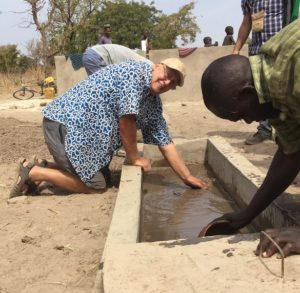
As at all the wells, the cattle drinking trough had become dirty. It is inevitable. There is so much dust and it is bound to be kicked up by the animals when they come to drink. So, Eddie rolled up his sleeves (metaphorically – he already had a short-sleeved shirt on anyway) and got down to the dirty business of clearing it out to show the local men how to do it. We emphasised that this should be done regularly to keep the cattle healthy.
Life is a little easier for about 600 people
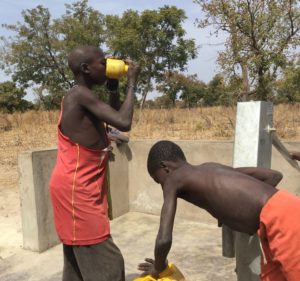
We were told that there are 50 houses which are served by this well. With the usual estimate of 10 or more per household, that means it serves between 500 and 600 people. Some still live 3km away. Their walk to the old well would have been up to 7 km. We are very happy that we have been able to help, just a little, to make their lives easier.
Time to leave
It would have been good to have spent more time here, but we had a long journey still to make. So, there was the usual round of handshaking from the people who had now arrived.
We set off – there was another visit to a well – a different one – planned for later in the day.
As of January 2020, Myra’s Wells has drilled 170 wells in Burkina Faso. We give God thanks for His provision to make this possible. We pray that the people who have benfitted from clean water will also come to taste the “Living water” of which Jesus spoke.